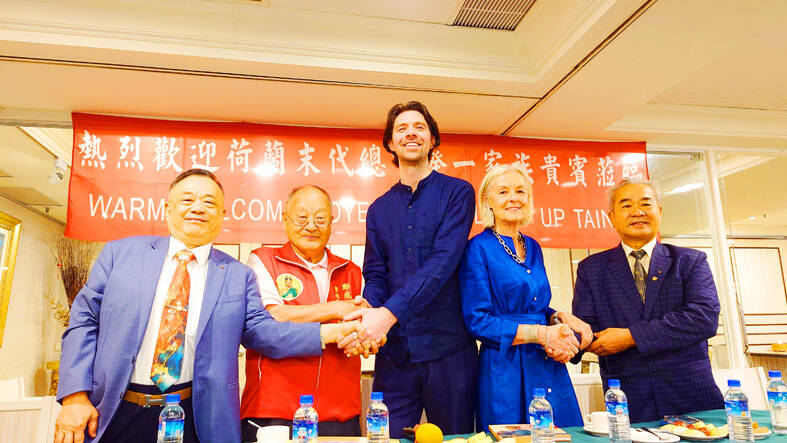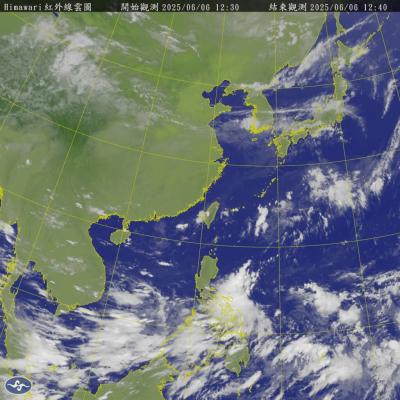Descendants of Frederick Coyett, the last Dutch governor-general of Formosa, yesterday visited the Koxinga Shrine (延平郡王祠) in Tainan to give thanks for showing mercy to their ancestor 400 years after the Dutch began their occupation of Taiwan proper.
Cheng Cheng-kung (鄭成功), also known as Koxinga, was a Ming Dynasty general who drove Dutch colonists out of Taiwan in 1662.
A 15th-generation descendant of Frederick Coyett, and his mother, wife of the 14th-generation descendant Michael Coyet (different spelling), shook hands with Koxinga Shrine management board deputy secretary-general Cheng Chao-nan (鄭照男) at a news conference at the ancestral shrine.

Photo: Hong Jui-chin, Taipei Times
Michael Coyet, who in 2006 visited the shrine, was not able to attend the news conference due to a flight delay.
The defeated governor told his family never to forget Koxinga’s magnanimity in sparing his family after the surrender of Fort Zeelandia following a lengthy siege, the 15th-generation descendant said.
“[My] ancestor Coyett was a very stubborn man … [who] wanted to stand his ground and did not want to be defeated, so I can imagine that negotiations must have been quite difficult for the governor,” he said.
“It must have been a very important and interesting meeting when Frederick had to give up this stubbornness and show humility,” the descendent said, adding that the family remember Koxinga as an honorable opponent worthy of respect.
Hsu Shih-yu (許世煜), chairman of Cambridge Hotel hosting the descendants, said Frederick Coyett later published Neglected Formosa, which severely criticized the Dutch East India Company for failing to support the colony’s defense.
Frederick Coyett praised his opponent, who had permitted him and his household to return home unharmed with all their possessions, he said.
The Dutch East India Company, which craved out a private empire during the age of discovery, never officially represented the Dutch Republic, so the Taiwanese and Dutch governments are happy to leave the past alone, he said.
Frederick Coyett’s descendants did not forget their history and for many years wanted to give thanks to the Cheng family again, a wish they fulfilled this year after making arrangements through unofficial channels, he said.

STAY AWAY: An official said people should avoid disturbing snakes, as most do not actively attack humans, but would react defensively if threatened Taitung County authorities yesterday urged the public to stay vigilant and avoid disturbing snakes in the wild, following five reported snakebite cases in the county so far this year. Taitung County Fire Department secretary Lin Chien-cheng (林建誠) said two of the cases were in Donghe Township (東河) and involved the Taiwan habus, one person was bit by a Chinese pit viper near the South Link Railway and the remaining two were caused by unidentified snakes. He advised residents near fields to be cautious of snakes hiding in shady indoor areas, especially when entering or leaving their homes at night. In case of a

A tropical disturbance off the southeastern coast of the Philippines might become the first typhoon of the western Pacific typhoon season, the Central Weather Administration (CWA) said. The system lacks a visible center and how it would develop is only likely to become clear on Sunday or Monday, the CWA said, adding that it was not yet possible to forecast the potential typhoon's effect on Taiwan. The American Meteorological Society defines a tropical disturbance as a system made up of showers and thunderstorms that lasts for at least 24 hours and does not have closed wind circulation.

ENERGY RESILIENCE: Although Alaska is open for investments, Taiwan is sourcing its gas from the Middle East, and the sea routes carry risks, Ho Cheng-hui said US government officials’ high-profile reception of a Taiwanese representative at the Alaska Sustainable Energy Conference indicated the emergence of an Indo-Pacific energy resilience alliance, an academic said. Presidential Office Secretary-General Pan Men-an (潘孟安) attended the conference in Alaska on Thursday last week at the invitation of the US government. Pan visited oil and gas facilities with senior US officials, including US Secretary of the Interior Doug Burgum, US Secretary of Energy Chris Wright, Alaska Governor Mike Dunleavy and US Senator Daniel Sullivan. Pan attending the conference on behalf of President William Lai (賴清德) shows a significant elevation in diplomatic representation,

Credit departments of farmers’ and fishers’ associations blocked a total of more than NT$180 million (US$6.01 million) from being lost to scams last year, National Police Agency (NPA) data showed. The Agricultural Finance Agency (AFA) said last week that staff of farmers’ and fishers’ associations’ credit departments are required to implement fraud prevention measures when they serve clients at the counter. They would ask clients about personal financial management activities whenever they suspect there might be a fraud situation, and would immediately report the incident to local authorities, which would send police officers to the site to help, it said. NPA data showed